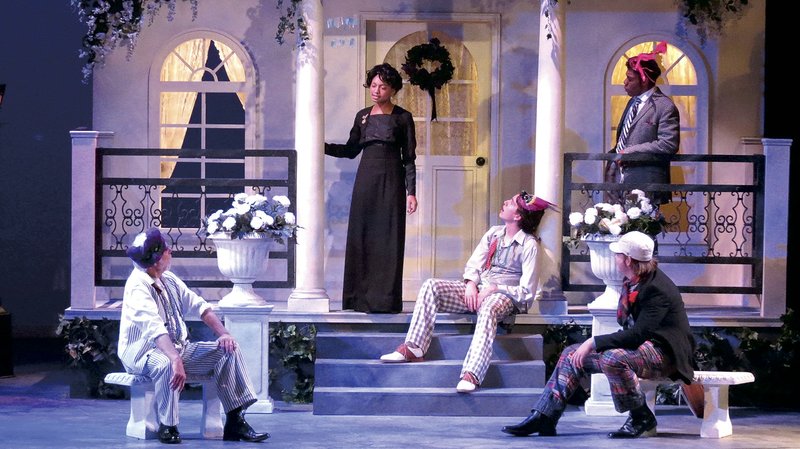Like all of Shakespeare's comedies, "Twelfth Night" is convoluted.
Twins Viola and Sebastian are separated in a shipwreck.
FAQ
‘Twelfth Night’
WHEN — 7:30 p.m. today & Saturday, 2 p.m. Sunday; again Nov. 18-22
WHERE — University Theatre in Fayetteville
COST — $5-$20
INFO — 575-4752
Viola dresses up as a man for her own protection and meets Duke Orsino, with whom she falls in love.
Duke Orsino is in love with Countess Olivia and sends Cesario (Viola dressed as a man) to plead his case.
Olivia falls in love with Cesario.
Olivia meets Sebastian, thinks he's Cesario -- twins, remember? -- and they marry.
Viola reveals she's a woman, and she and Orsino marry.
Curtain.
Now imagine that all this -- a big storm, revelry, music, masks, mistaken identities -- happens in a "vibrant waterfront city" well known for all of those things: New Orleans.
"When producing a play by William Shakespeare, many directors choose to set the play in a more contemporary time and place than the playwright intended, to illuminate the themes, relationships and spirit of the play to a modern audience," says Jenny McKnight, director of the University Theatre production opening tonight. "What I want to highlight about the play really translates well to New Orleans."
It didn't hurt that McKnight, a relatively new professor in the University of Arkansas theater department, honeymooned in New Orleans with her new husband, Grant Goodman, in January of this year.
"I had been there before, but we had never been there together," she says. "Seeing all the music and culture and the rich history of the city really inspired me.
"'Twelfth Night' is one of those plays that doesn't really have to be set in any specific time period -- not 'Antony and Cleopatra' or 'Richard III.' [And] as we rehearsed the play and honed our design ideas," she says, "we uncovered even more parallels between 1900s New Orleans and Shakespeare's Illyria.
"I don't have a lot of experience with Shakespeare," adds McKnight, a longtime professional actor. But her husband does. In fact, the two found their way to Fayetteville when Goodman appeared in the TheatreSquared production of "Hamlet."
"He and I agreed this would be a good choice for the students. It's always a good thing for actors to be well versed in Shakespeare. It teaches actors a lot about performance -- sometimes the hard way! So the main genesis was to provide the opportunity."
Music plays a significant role in the play, as it does in the city, and New Orleans' famous architecture was re-created in the set.
"Duke Orsino's mansion is the French Quarter style with the wrought iron gallery -- it's on one side of the stage -- and on the other side, Olivia's Garden District mansion," McKnight says. "They're representative of the two households but also of the very conventional, historic part of New Orleans versus the French Quarter party, jazz area. The balance we find between those two houses and those two characters is represented really well.
"We set our play in the turn of the century, around 1910, so the costumes are typical to that time, with some Mardi Gras elements at the beginning plus a couple of sea captains," she adds.
"One of the things I really do like about the way it ended up is we have a pretty culturally diverse cast. It wasn't really my intention to stick to racially based casting or not. But people who were right for each role created this really nice hodgepodge of different backgrounds."
McKnight says none of Shakespeare's language was altered to fit the new location except changing things like ducats to dollars.
"Traditionally American actors performing Shakespeare use American voices," she adds, so there will be no Cajun or Creole accents to muddy up the words. "Our primary goal -- and we've been talking about it since the first day -- is clear storytelling."
It is McKnight's hope that audiences will enjoy seeing Shakespeare's work presented the way it was intended to be -- on stage, not as assigned reading.
"It gladdens my heart to imagine seeing a production of Shakespeare may change their minds," she says. "Seeing it performed live, ripped from the page, just breathes new life into the characters, the situation, the humor, the fun, the beautiful word play that you get from listening to it, not just reading it."
NAN What's Up on 11/13/2015

